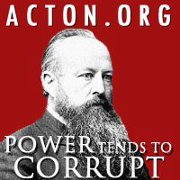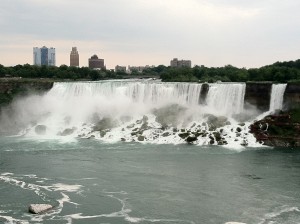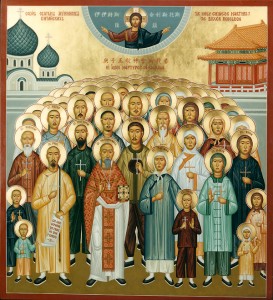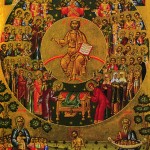Editors Note: When Fr. John wrote these words he came under much criticism from laity, clergy, and the hierarchy. These are words that need to be spoken and read more so today then they were when written in 2008. We need may more courageous priests like Fr. John who are willing to speak the truth regardless of the cost. Read his words and as always your comments are welcome.
By: Fr. John Peck
First Published: September 16, 2008
There is an interesting phenomenon occurring in Orthodox Christianity in America today, and reflected powerfully in our seminaries. Seminaries are loaded almost exclusively with converts, reverts (cradle Orthodox who left the faith, and were re-converted to it again), and the sons and grandsons of clergy.
I believe we are looking at the future of the American Orthodox Church — today.
The notion that traditionally Orthodox ethnic groups (the group of ‘our people’ we hear so much about from our primates and hierarchs) are going to populate the ranks of the clergy, and therefore, the Church in the future is, frankly, a pipe dream. Orthodoxy, despite the failings of its leadership, has actually lived up to its own press. The truth of the Orthodox faith, as presented on paper, is actually being believed – by those who have no familial or historical connection with the Orthodox. These poor deluded souls (of which I count myself) actually believe what they are reading about the Orthodox faith, and expect the Church to act like, well, the Church. They refuse to accept the Church as a club of any kind, or closed circle kaffeeklatsch. No old world embassies will be tolerated for much longer – they will go the way of the dodo. No one will have to work against them; they will simply die from atrophy and neglect. The passing away of the Orthodox Church as ethnic club is already taking place. It will come to fruition in a short 10 years, 15 years in larger parishes.
This is a well known problem. Statistical studies taken a mere seven years ago predicted that within 10 years the Orthodox Church in the United States would for all practical purposes, no longer be viable. If nothing was done within five years (that’s two years ago) the decline would be irreversible. Demographics determine destiny, as they say. As you may have imagined, not only was “nothing done,” such reports were surreptitiously filed away, while the calls for a solution from clergy and laity alike only increased. Larger jurisdictions will, of course, have a little more time, but not a different result.

What we are looking at, of course, is of the highest concern to the hierarchy. They know, in their heart of hearts, that they cannot reverse this trend. Yet they fight a rearguard action, hoping against hope to forestall the historically inevitable movement toward an American Orthodox Church.
Statistical studies taken a mere seven years ago predicted that within 10 years the Orthodox Church in the United States would for all practical purposes, no longer be viable.
The laity has already moved on. Americans, generally, don’t fall for very much strong arm intimidation or brow beating, don’t go for bullying by insecure leaders, and certainly don’t see the value of taking on and promoting someone else’s ethnic culture. They care about the Gospel, and the Gospel does not require Slavonic or Koine Greek, or even English for that matter. The Gospel requires context, which is why it cannot be transmitted in any language unknown to the listener.
When we look at our seminaries, we are looking at the Church of Tomorrow, the Church twenty years from now. Indeed, this is the Church we are building today.
Twenty years from now, I anticipate we will see the following:
- Vastly diminished parishes, both in size and number. There will be a few exceptions, (and they will be exceptional!) but for the most part, most current Orthodox parishioners will age and die, and have no one to replace them. Why? Because as they have taught the context of their culture, instead teaching the context of their faith. Some parishes will simply be merged with others. Many will close outright. A few will change how they do ministry, with a new vision of parochial ecclesiology. These newer parishes will be lighthouses of genuine Orthodox piety and experience. Some parishes, I believe, will actually be formed specifically, in the old fashion, by purchasing land, building a chapel or Temple in the midst of it, and parishioners building or buying homes around it. The Church will be the center of their lives, and many will come from far and wide to experience their way of life.
- Publicly renowned Orthodox media and apologetic ministries. These ministries are the ones providing a living and powerful apologetic for the Orthodox faith in our culture (that is, our 21st Century life in the United States), and actually providing the Gospel in its proper context – engaged in society and the public arena. These will succeed in visibility and public awareness more than all the speeches before the U.N. and odd newspaper stories about Orthodox Easter or Folk Dance Festivals could ever do. In other words, the Orthodox Christian faith will become that most dangerous of all things – relevant to the lives of Americans, and known to all Americans as a genuinely American Christian entity.
- More (and younger) bishops. If our current slate of bishops has been mostly a disappointment, reducing their number will only tighten this closed circle, making the hierarchy less and less accessible, and more and more immune to things like, oh, the needs and concerns of their flock. The process of selection for the episcopacy will contain a far more thorough investigation, and men with active homosexual tendencies, psychological problems, insecurities, or addictions will simply not make the cut. We aren’t far from open persecution of Christians by secularists in this country, and we need bishops who know the score. With better bishops, no one will be able to ‘buy’ a priest out of a parish with a gift of cash. Conversely, parish councils will no longer be able to bully priests into staying out of their affairs, and will be required to get out of the restaurant/festival business and get into the soul saving business.
- A very different demographic of clergy. Our priests will be composed of converts, reverts, and the sons and grandsons of venerable, long-suffering clergy. These men all know the score. They won’t tolerate nonsense like homosexual clergy (especially bishops), women’s ordination, or financial corruption. They will not tolerate the Church being regularly and unapologetically dishonored by her own clergy. Twenty years from now, these convert and revert priests will be sending life-long Orthodox men, a new cradle generation, en masse to our seminaries. They will be white, black, Asian, Polynesian, Hispanic, and everything in between. Fewer will be Russian, Greek, or any other traditionally Orthodox background.
- Orthodox Biblical Studies. Orthodox Biblical scholarship will flourish, and will actually advance Biblical Studies, rather than tag along for the latest trends, staying a minimum safe distance back in case the latest theory tanks unexpectedly. Septuagint studies are already on the rise and Orthodox scholars will usurp the lead in this arena, establishing a powerful and lasting influence in Biblical Studies for decades to come. Orthodox higher education — specifically in Biblical Studies in the Orthodox tradition — will finally have a place at the doctoral level in the Western hemisphere, and it will become a thriving academic entity. The whole Church will feed on the gleanings of this new scholarship and Scriptural knowledge, preaching, and Biblical morality will invigorate the Church for generations.
- A much higher moral standard from all clergy. The next twenty years will see a revival of practical ethics. Instead of trailing military or business ethics, the Church will, once again, require the highest standard of ethical and professional behavior from her clergy — and they will respond! The clergy will not tolerate lying, cheating, or stealing and hold to account those who practice these vices. They will vigorously defend the honor of Christ’s priesthood, and Christ’s Church. I dare say, even the clergy will finally respect their own priesthood.
- Vocations will explode. As a result of the elevated ethical standard publicly expected from the clergy, candidates in far greater numbers will flock to the priesthood. There will be very full classes, distance education, self-study and continuing education going on in every location. Education at a basal level will disappear, except in introductory parish classes. Clergy will powerfully articulate Orthodoxy to the faithful and to the culture around them. Personal opinion will no longer be the standard for clergy when articulating Orthodox ethics and morality. Our seminaries must become beacons for this teaching, and give up “training culture” once and for all. We will finally begin to penetrate our society, rather than go along for the ride like a tick on a dog’s back.
- Philanthropy will flow like the floodgates of heaven. Finally, the many Orthodox Christian philanthropists who annually give millions of dollars to secular institutions will finally find their own Church completely transparent, completely accountable, and worthy of their faith-building support. Let’s face it, there is more than enough money in Orthodoxy right now to build hospitals, clinics, schools, colleges, universities, and a new Hagia Sophia right here in the United States. The reason this is not being done is because these philanthropists are intelligent men and women who do not trust the hierarchy to do the right thing with their millions. This will change in short order once it is shown that transparency doesn’t destroy the Church, but strengthens it immeasurably. Frankly, I don’t anticipate every jurisdiction to do this in the next twenty years, but those that are practicing transparency will emerge as the leaders in every arena of Church existence.
Hope
This all may seem unlikely today, but it is coming.
How do I know this? For one thing, the last holdouts of corruption, Byzantine intrigue and phyletism (a fancy theological term for ethnic preference) are clinging desperately to a vision of the Church that is, quite frankly, dying fast. Oh, they are doing everything to shore up their power and influence, and busy serving their own needs, but their vision is dying. And where there is no vision, the people perish (Proverbs 29:18).
As frightening and disconcerting as it may seem to our leaders, they will learn that emerging from a cocoon, even a Byzantine cocoon, is not a bad thing. Orthodoxy is about to take flight on new beautiful wings. These are the birth pangs of a new era for Orthodoxy. God is giving us a time of freedom and light.
This new Orthodox Church will have a different face, will be ready for contemporary challenges, and will have begun to penetrate American society at every stage and on every level. This Church is the one that will be ready for the challenges of open persecution, fighting for the soul of every American, regardless of their genetic affiliation. This Church will be the one our grandchildren and great grandchildren will grow up in, looking back on the late 20th-early 21st century as a time of sentimental darkness from which burst forth the light of the Gospel. Let it begin.









